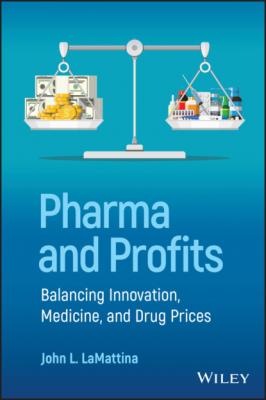Pharma and Profits. John L. LaMattina
Читать онлайн.| Название | Pharma and Profits |
|---|---|
| Автор произведения | John L. LaMattina |
| Жанр | Зарубежная деловая литература |
| Серия | |
| Издательство | Зарубежная деловая литература |
| Год выпуска | 0 |
| isbn | 9781119881353 |
“We are excited about entering an agreement to acquire The Medicines Company as inclisiran is a potentially transformational medicine that reimagines the treatment of atherosclerotic heart disease and familial hypercholesterolemia. With tens of millions of patients at higher risk of cardiovascular events from high LDL‐c, we believe that inclisiran could contribute significantly to improved patient outcomes and help healthcare systems address the leading global cause of death. The prospect of bringing inclisiran to patients also fits with our overall strategy to transform Novartis into a focused medicines company and adds an investigational therapy with the potential to be a significant driver of Novartis’s growth in the medium to long term.”
It is important to note that a CVOT for inclisiran will not be completed until 2024 (ORION‐4). The FDA did approve inclisiran (brand name: LeqvioTM) at the end of 2021. But, Novartis discarded Meanwell’s vision for this drug. CEO Narasimhan believed that LeqvioTM represented a revolutionary approach to treating heart disease and priced it accordingly – $3 250 per dose ($6 500 a year)[15].
Regardless of the LeqvioTM surprise, PCSK9 modulation is a far more economically viable option than the original $14 600 per year price tag. As a result, patients with heart disease are going to benefit. Dr. Steve Miller said that these drugs would become “the most costly therapy our country has ever seen.” That has proven to be an exaggeration.
* * * * * * * * * * * * * *
There are some similarities between the hepatitis C and the PCSK9 drug stories. Both involved great science leading to true medical breakthroughs that benefit millions of patients around the globe. Yet, the excitement for both breakthroughs was unfortunately muted by price concerns – however justified. In fact, the cost of these drugs was said to threaten the entire healthcare system. But, competition pushed down their prices so it is difficult for insurers to deny access.
But for me, the PCSK9 saga added two new wrinkles. The first was the payers’ blatant refusal to allow access to millions of heart patients who could have benefitted from these drugs. Yes, payers had already begun to flex their muscles, for example, in limiting access to specialty rare disease drugs. But this time, cardiologists were greatly dissuaded in prescribing these drugs to those at high risk of a heart attack by being required to submit multiple rounds of paperwork to justify the needs of their patients.
The second stunner was that Amgen began offering money‐back guarantees for RepathaTM. When you consider that this medicine is prescribed to heart patients who are most likely to eventually die from a cardiovascular event, a money‐back guarantee is pretty mind‐boggling no matter how the agreement is constructed.
There was a time when a company solely focused on getting an FDA approval for its new drug. Once that approval was in hand, commercial success was a reasonable probability. That is no longer sufficient for a new medical breakthrough. Payers now have a big seat at the table. They can make or break a new product. It is a new world.
REFERENCES
1 1. LaMattina, J.L. (2009). Drug Truths: Dispelling the Myths About Pharma R&D, 16–22. Wiley. Chapter 2.
2 2. Mangan D.; Tirrell, M. (2015). Pricey new cholesterol Rx covered by big drug plan, but…. CNBC.com. 6 October.
3 3. Kaufman, T.M., Duell, P.B., Purnell, J.Q. et al. (2017). Application of PCSK9 inhibitors in practice. Circulation Research 121: 499–501.
4 4. Kolata, G. (2017).Cholesterol‐Slashing Drug Can Protect High‐Risk Heart Patients, Study Finds. New York Times. 17 March.
5 5. Herper, M. (2017). Amgen Drug Prevents Heart Attacks, Not Deaths, Disappointing Experts. Forbes.com. 17 March.
6 6. Schwartz, G.G., Steg, P.G., Szarek, M. et al. (2018). Alirocumab and cardiovascular outcomes after acute coronary syndrome. New England Journal of Medicine 379: 2097–2107. 29 November.
7 7. Rockoff, J.D. and Hufford, A. (2016). Pfizer cuts outlook, ends development of cholesterol drug. Wall Street Journal 1 November.
8 8. LaMattina, J.L. (2017). Amgen’s Money Back Guarantee For Its Cholesterol Drug, Repatha. Forbes.com. 4 April.
9 9. Beasley, D. (2018). Amgen cuts price of cholesterol drug Repatha by 60%. Reuters. 24 October.
10 10. Herper, M. (2019). Regeneron and Sanofi cut Praluent price 60%, as low‐selling drugs become a drug pricing laboratory. STAT. 11 February.
11 11. Ray, K.K., Landmesser, U., Leiter, L.A. et al. (2017). Inclisiran in patients at high cardiovascular risk with elevated LDL cholesterol. New England Journal of Medicine 376: 1430–1440. 17 March.
12 12. LaMattina, J.L. (2018). The Medicine Company CEO, Dr. Clive Meanwell on the Impact of ODYSSEY Outcomes For Heart Patients. Forbes.com. 20 March.
13 13. Ray, K.K., Wright, R.S., Kallend, D. et al. (2020). Two phase 3 trials of Inclisiran in patients with elevated LDL cholesterol. New England Journal of Medicine 382: 1507–1519. 16 April.
14 14. Novartis Press Release (2019). Company for USD 9.7 bn, adding inclisiran, a potentially transformational investigational cholesterol‐lowering therapy to address leading global cause of death, 24 November.
15 15. LaMattina, J.L. (2022). It Was To Be the Cholesterol Drug for the Masses. Novartis Changed That. 3 January.
Конец ознакомительного фрагмента.
Текст предоставлен ООО «ЛитРес».
Прочитайте эту книгу целиком, купив полную легальную версию на ЛитРес.
Безопасно оплатить книгу можно банковской картой Visa, MasterCard, Maestro, со счета мобильного телефона, с платежного терминала, в салоне МТС или Связной, через PayPal, WebMoney, Яндекс.Деньги, QIWI Кошелек, бонусными картами или другим удобным Вам способом.
